
Early Science and Medicine
Scope & Guideline
Revealing the Intersections of Knowledge and Healing
Introduction
Aims and Scopes
- Historical Analysis of Scientific Thought:
The journal emphasizes the historical evolution of scientific ideas, particularly in the context of early modern Europe, examining how philosophical concepts were integrated into scientific practices. - Interdisciplinary Studies:
A core focus is on interdisciplinary approaches that blend history, philosophy, and the sciences, providing a comprehensive view of knowledge production and dissemination during the early modern period. - Cultural and Social Context of Medicine:
The journal explores the social and cultural dimensions of medical practices, including gender roles, societal norms, and the impact of cultural exchanges on medical knowledge. - Influence of Classical Traditions:
It investigates how classical texts and traditions shaped early modern science and medicine, including the reception of ancient Greek and Roman philosophies. - Technological Innovations and Instruments:
The publication frequently addresses the role of technological advancements and the development of scientific instruments in shaping early modern scientific inquiry.
Trending and Emerging
- Gender Studies in Science and Medicine:
There is a growing body of research examining the role of gender in the development of scientific knowledge and medical practices, highlighting the contributions and experiences of women in early modern contexts. - Cultural Exchanges and Knowledge Transfer:
The journal is seeing an uptick in articles that explore cultural interactions, particularly between Europe and the Ottoman Empire or other regions, emphasizing how these exchanges enriched scientific and medical knowledge. - The Role of Visualization and Memory Techniques:
Recent publications have increasingly focused on the arts of visualization and memory in early modern education, reflecting an interest in how these techniques were employed to enhance learning and knowledge retention. - Reassessment of Classical Texts:
A trend towards reassessing classical texts and their influence on early modern thought is evident, with scholars revisiting foundational works to uncover their relevance to contemporary discussions. - Environmental and Ecological Influences on Early Science:
Emerging themes include the investigation of environmental factors and ecological knowledge as influential in shaping early modern scientific and medical practices, highlighting the interconnectedness of nature and knowledge.
Declining or Waning
- Astrology's Role in Science:
Once a prominent theme, the exploration of astrology's influence on scientific thought and practice has diminished, reflecting a broader trend towards empirical methodologies and skepticism of astrological claims. - Medieval Medical Practices:
The journal has gradually published fewer articles specifically addressing medieval medical practices, as the focus shifts more towards the early modern period and its unique contributions to science and medicine. - Philosophical Theories of Emotion:
Research on the philosophical underpinnings of emotions as they relate to early modern science has become less frequent, possibly due to a shift in focus towards more empirical and observable phenomena. - Natural Philosophy as a Distinct Discipline:
The delineation of natural philosophy as a separate field has waned, with more emphasis being placed on integrated approaches that consider science and philosophy as interconnected rather than distinct. - Historical Figures in Isolation:
There has been a noticeable decrease in articles focusing solely on individual historical figures without contextualizing their work within broader scientific or philosophical movements.
Similar Journals
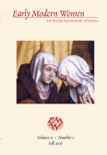
Early Modern Women-An Interdisciplinary Journal
Unveiling the Past: Women’s Stories in Early ModernityEarly Modern Women: An Interdisciplinary Journal, published by the University of Chicago Press, serves as a vital platform for exploring the diverse experiences and contributions of women during the early modern period. With an ISSN of 1933-0065 and an E-ISSN of 2378-4776, this journal aims to enrich the discourse in gender studies by presenting interdisciplinary research that spans literature, history, and cultural studies. Although currently categorized in the Q4 quartile within Gender Studies and ranking in the 5th percentile, it plays an essential role in nurturing upcoming scholarship in a field marked by ongoing exploration and debate. Aimed at researchers, professionals, and students alike, the journal not only provides critical insights but also fosters dialogue about gender dynamics in historical contexts. By focusing on the convergence of scholarly efforts from 2010 to 2011 and 2015 to 2024, the journal ensures a comprehensive examination of its evolving scope, inviting contributions that will shape understanding of women's roles in early modern societies.
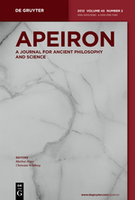
Apeiron-A Journal for Ancient Philosophy and Science
Fostering Dialogue Between Ancient Philosophy and Modern ScienceApeiron - A Journal for Ancient Philosophy and Science is a distinguished academic journal published by Walter de Gruyter GmbH, based in Berlin, Germany. As an essential platform for scholars in the fields of History and Philosophy of Science and Philosophy, this journal holds a prestigious Q1 ranking in both domains as of 2023, reflecting its significant impact and contribution to these disciplines. With its ISSN 0003-6390 and E-ISSN 2156-7093, Apeiron aims to foster interdisciplinary dialogue by publishing original research, reviews, and critical essays that explore the rich intersections of ancient thought and scientific inquiry. As the journal converges into its fifth year from 2019 to 2024, it offers a vital resource for researchers, professionals, and students seeking to deepen their understanding of classical philosophical traditions and their relevance to contemporary science. Although it operates under a subscription model, the rigorous peer-review process ensures that each publication maintains the highest academic standards, thus solidifying Apeiron's status as a pivotal resource in its field.

Spontaneous Generations-Journal for the History and Philosophy of Science
Illuminating the Past to Understand the Future of ScienceSpontaneous Generations: Journal for the History and Philosophy of Science is a dedicated publication focusing on the rich fields of history and philosophy within the scientific domain. Published by the Institute for the History and Philosophy of Science and Technology, this journal provides a vital platform for scholars, researchers, and students to explore and disseminate ideas that bridge the historical context and philosophical inquiries of scientific practices. With its commitment to open access, Spontaneous Generations ensures that groundbreaking research is widely available, fostering an environment of collaboration and knowledge sharing. Aiming to engage a diverse audience, this journal is pivotal for those looking to understand the evolution of scientific thought and its implications on contemporary issues, making it an essential resource in the academic community.

Dynamis
Cultivating Academic Excellence in History and Philosophy of ScienceDynamis is a distinguished journal published by EDITORIAL UNIV GRANADA, focusing on the interdisciplinary fields of History and Philosophy of Science as well as Medicine. Since its inception in 1981, this journal has provided a platform for scholarly discussion and exploration of the evolution of scientific thought and medical practices, with a consistent commitment to enriching academic dialogue up to the year 2024. Operating within the Q4 category for both History and Philosophy of Science and Medicine in the 2023 rankings, it holds a unique niche despite its positioning and aims to amplify underrepresented voices and perspectives via rigorous academic analysis. Although not currently an open-access publication, Dynamis continues to serve as a vital resource for researchers, professionals, and students who are keen to understand the historical contexts and philosophical implications in these fields. Its impact within the academic community is reflected in its Scopus rankings, offering valuable insights into the interplay between history, philosophy, and medicine. Situated in beautiful Granada, Spain, Dynamis remains committed to fostering a deeper understanding of the sciences through a historical and philosophical lens.

RENAISSANCE AND REFORMATION
Connecting Past and Present through Scholarly DiscourseRENAISSANCE AND REFORMATION is a distinguished academic journal that serves as a vital resource in the fields of history, literature, arts, and philosophy, with a specific focus on the expansive cultural shifts from the Renaissance to the Reformation. Published in Canada, this journal provides scholars, students, and professionals with an avenue to explore the intricate dynamics that shaped early modern thought and practice. While it is not an open access publication, it maintains a commitment to high academic standards, reflected in its diverse range of quartile placements across various categories, including Q3 in Literature and Literary Theory and Q4 in History. The journal is crucial for advancing scholarly discourse on early modern studies and facilitates a deeper understanding of the cultural and intellectual transformations that occurred during this pivotal historical period. RENAISSANCE AND REFORMATION continues to attract contributions from leading researchers and emerging scholars alike, making it an essential read for anyone invested in the complexities of historical thought and artistic expression.

Historical Studies in the Natural Sciences
Exploring the Nexus of History and ScienceHistorical Studies in the Natural Sciences is a prestigious journal published by University of California Press, dedicated to advancing the understanding and appreciation of the interconnections between natural sciences, history, and philosophy. With an ISSN of 1939-1811 and an E-ISSN of 1939-182X, this journal has established itself as a vital resource for researchers, professionals, and students interested in the historical context and philosophical implications of scientific developments. As of 2023, it holds an impressive Q3 ranking in the category of History and Philosophy of Science and ranks 76th in the Arts and Humanities domain according to Scopus, representing the 65th percentile among peers. The journal spans a convergence of studies from 2008 to 2024, offering insights that bridge gaps between historical perspectives and scientific inquiry. Open access options enhance its accessibility, fostering a broader dialogue within the academic community and beyond. This journal stands as an important platform for scholars aiming to explore the rich tapestry of natural sciences through a historical lens, contributing significantly to the ongoing discourse in the field.

Journal of Early Modern Studies-Romania
Unveiling the Richness of Romania's Early Modern StudiesThe Journal of Early Modern Studies-Romania serves as a vital platform for scholars and enthusiasts alike within the field of early modern studies. Published by ZETA BOOKS, this journal fosters a rich discourse on the cultural, political, and intellectual developments that shaped Romania and its connections to the broader European narrative during the early modern period. With an ISSN of 2285-6382 and an E-ISSN of 2286-0290, the journal is poised to contribute significantly to academic literature despite not currently being Open Access, facilitating access through academic institutions. The scope of the journal includes but is not limited to history, literature, art, and social studies, ensuring a multidisciplinary approach to early modern inquiry. Researchers, professionals, and students will find invaluable insights and innovative research avenues spotlighted in each issue, residing at the intersection of local and transnational early modern studies.
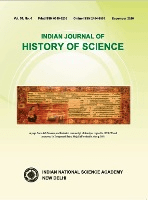
INDIAN JOURNAL OF HISTORY OF SCIENCE
Navigating the Intersection of History and Scientific ProgressINDIAN JOURNAL OF HISTORY OF SCIENCE, published by the Indian National Science Academy, offers a vital platform for researchers, professionals, and students dedicated to the exploration of the historical development of science and technology in India and beyond. With the ISSN 0019-5235 and E-ISSN 2454-9991, this peer-reviewed journal aims to promote interdisciplinary collaboration by publishing original research articles, reviews, and discussion papers that highlight the contributions and evolution of scientific thought throughout history. The journal fosters a unique understanding of how historical contexts have shaped current scientific paradigms, making it an essential resource for academic inquiry. Although it does not currently offer Open Access options, the journal's rigorous editorial standards ensure that it maintains a significant impact within the scholarly community, serving as a crucial reference point for historical scholarship in the sciences. Its address in Bahadur Shah Zafar Marg, New Delhi 110 002, India, situates it within a rich tapestry of cultural and academic heritage, further enhancing its significance in the field.
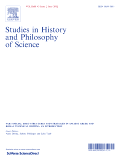
STUDIES IN HISTORY AND PHILOSOPHY OF SCIENCE
Charting the Philosophical Landscape of Scientific ProgressSTUDIES IN HISTORY AND PHILOSOPHY OF SCIENCE, published by Elsevier Science Ltd, is a leading academic journal dedicated to the exploration of historical and philosophical dimensions of science. With both an ISSN of 0039-3681 and E-ISSN of 1879-2510, this esteemed journal has established itself as a pivotal resource since its inception in 1970 and continues to publish cutting-edge research reflecting the evolution of scientific thought. Situated in the United Kingdom, it is recognized for its high-impact contributions, boasting a Q1 ranking in both History and History and Philosophy of Science categories as of 2023. Researchers in the humanities will benefit from the journal’s rigorous analysis and insightful discussions, as evidenced by its competitive Scopus rankings—placing it in the 96th and 83rd percentiles in their respective fields. Although not an open-access journal, it maintains a commitment to scholarly excellence, aiming to foster a deeper understanding of the interconnections between historical context and philosophical inquiry in the scientific domain, making it an invaluable resource for students, professionals, and researchers alike.
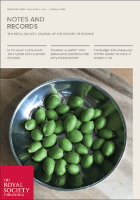
Notes and Records-The Royal Society Journal of the History of Science
Documenting the Journey of Scientific ExplorationNotes and Records - The Royal Society Journal of the History of Science is an esteemed scholarly journal published by the Royal Society in the United Kingdom, focusing on the historical aspects of science and its impact on modern scientific practices. With an ISSN of 0035-9149 and E-ISSN 1743-0178, this journal serves as a vital platform for researchers, professionals, and students who seek to explore the intricate connections between historical developments and contemporary scientific discourse. Recognized for its academic rigor, it holds a commendable position in the Q3 category of the History and Philosophy of Science field, ranking #56 out of 223 according to Scopus, and showcasing a 75th percentile ranking. Covering converged years from 1970 to 1973 and from 1975 to 2024, the journal publishes articles that contribute significantly to the understanding of the evolution of scientific thought. While it currently does not operate under an open access model, its esteemed content continues to engage a broad readership, fostering a deeper appreciation for the history behind scientific innovation and inquiry.